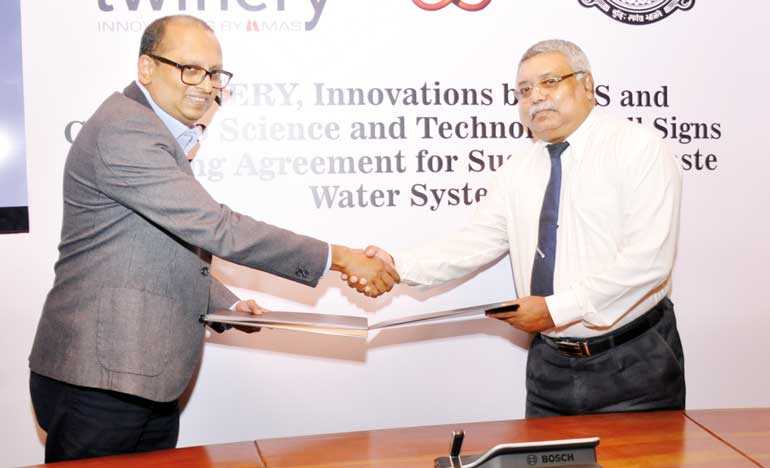Thursday Feb 19, 2026
Thursday Feb 19, 2026
Thursday, 15 August 2019 00:20 - - {{hitsCtrl.values.hits}}

MAS Holding Chief Innovation Officer Ranil Vitarana (left) and Colombo University Science Faculty Dean Prof. K. R. R. Mahanama exchange the MoU.

By Charumini de Silva
Twinery, the innovation arm of MAS Holdings, and Colombo Science and Technology Cell of the University of Colombo, have developed a homegrown sustainable solution for wastewater treatment with far reaching environmental, industrial and economic benefits.
This revolutionary process of ‘waste-to-treat-water’ is a sustainable closed-loop model, which creatively uses the waste from aluminium anodising to treat the wastewater from the textile industry, with any final waste converted into eco-bricks.
To implement this filter technology at MAS Fabric Park, a licensing agreement was signed between Twinery and Colombo Science and Technology Cell on Tuesday.
This innovation was developed within eight months, through a series of undergraduate research projects with a minimum funding of Rs. 16,000, in the Department of Physics of the University of Colombo. However, it was said that the new solution can significantly save about $1 million annually, across the entire spectrum of industries that has wastewater treatment at industrial zones in Sri Lanka.
University of Colombo Senior Lecturer (Physics) and Principal Investigator of the Project Dr. Dilushan Jayasundera said the idea was to convert sludge from the aluminium industry to use as a filter material, to treat the wastewater from the apparel industry. The textile industry currently uses costly agents to treat wastewater, to ensure that it is meeting strict local and international standards. This new filter technology has proved the possibility of partially or even fully replacing such agents with an aluminium sludge-based solution.
“It all began when Twinery and the Colombo Science and Technology Cell of the University of Colombo teamed up to find a solution for a cheaper, environmentally sound process for treating wastewater in the textile industry,” he added.
FT Key take
This revolutionary process of ‘waste-to-treat-water’ is a sustainable closed-loop model which creatively uses the waste from aluminium anodising to treat the wastewater from the textile industry, with any final waste converted into eco-bricks
Dr. Jayasundera also said the research was supported by Dr. Shashiprabha Vithanarachchi, Shalika Meedin, and a team from Colombo Science and Technology Cell of the University of Colombo, including Kushani Hettiarachchi, Kasun Sankapala, as well a team from MAS, which includes Ranil Vitarana, Sarah Dole, and Harsha Deraniyagala.
MAS Holdings Chief Innovation Officer Ranil Vitarana said with this innovation, the potential for total industrial sludge waste of the aluminium industry and MAS is expected to be reduced by 40% to 50%. “This sustainable solution for wastewater treatment has great potential to eliminate solid waste from the aluminium industry, that would otherwise been disposed, and is instead converted to a water treatment material, and eliminates the importation of expensive wastewater treatment agents,” he pointed out.
While the entire apparel industry could save $1 million annually with the implementation of this new filter technology, Vitarana said if all MAS plants are converted into this homegrown solution, they could save around $320,000 per year.
He noted that the complete implementation of the new filter technology at MAS depends on the successful implementation of the project at its largest plant in Thulhiriya. “Right now, we have a single experimental plant, which is conducting this filter technology at our Thulhiriya factory. If all goes well, we can extend it to other plants in MAS, as well as to the entire apparel industry.”
Creating a demand for the eco-brick, which is the end product of the solution, is a challenge, he pointed out. “At the moment, the construction industry is not doing well, and we don’t see a demand for this brick. The challenge now is to convert it to a brick, and that’s where we have to invest more money, to do that conversion,” he said.
Vitarana said the initiative also underscores the importance of university-industry partnerships and the potential for producing homegrown solutions that could have a global impact.
“Although MAS funded the initial research, the company agreed not to have any exclusivity on it, as they want the University of Colombo to get the benefit of it. As a leading apparel company over the years, we have been trying to get our academia and the industry together to help each other and get our industries into new heights. The University has the sole rights to commercialise the research with any industry, so that the whole of Sri Lanka can benefit.”
Pix by Lasantha Kumara
